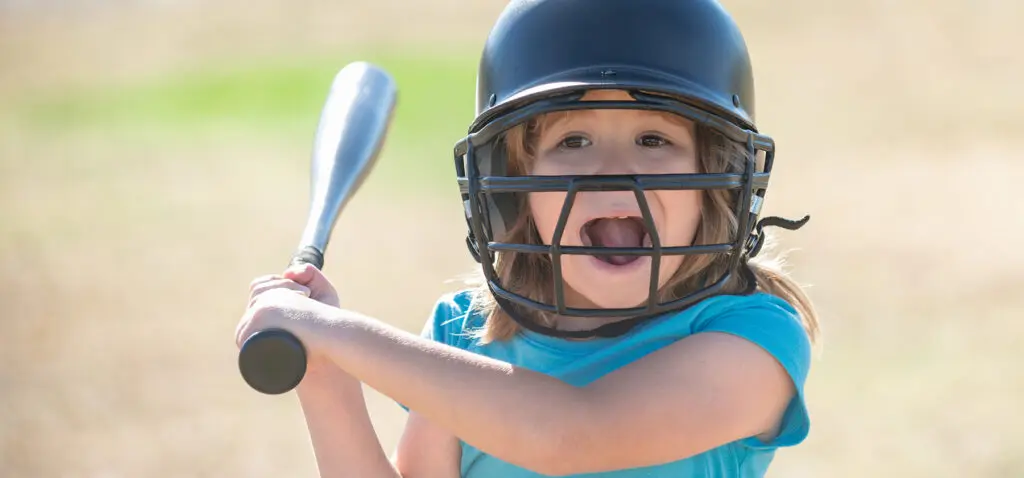Reviewed by Dr. David Sentelle
Reading time: five minutes
Broken teeth. Cut lips. Knocked-out permanent teeth. These injuries are all too common in youth sports—and most of them are preventable.
Whether your child plays football, rides BMX bikes, or just loves to tumble and compete, the risk of dental trauma is real. The good news? With the right protection and a few smart habits, you can help your child avoid painful injuries and keep their smile intact.
In this blog, we cover the most common sports-related dental injuries in kids and teens, which sports carry the highest risks, and how to prevent serious damage with practical, age-appropriate protection.
Table of Contents
Key Takeaway
To prevent sports-related dental injuries in kids and teens, focus on four key steps: wear a custom mouthguard, use helmets and face shields, keep up with dental checkups, and make sure coaches know how to respond to dental emergencies.
Common Dental Injuries in Youth Sports
A fall, collision, or hard hit can lead to serious dental injuries. Here are the five most common types we see in young athletes::
- Tooth fractures (chips or breaks)
- Tooth intrusion (pushed into the gums)
- Tooth avulsion (knocked-out teeth)
- Tooth luxation (moved but still in the socket)
- Soft tissue injuries (cuts and bruises inside the mouth)
Which Sports Pose the Highest Dental Risks?
Some sports put teeth and facial structures at greater risk than others. Below is a chart that highlights which sport activities are most associated with dental trauma and the types of injuries most often reported.
| Sport | Common Injuries | Risk Level |
| Basketball | Chipped teeth, soft tissue injuries | High |
| Football | Tooth intrusion, jaw fractures | High (if no helmet/mouthguard) |
| Hockey | Avulsions, knocked-out teeth | Very High |
| Baseball/Softball | Fractures from bat or ball impact | High |
| Soccer | Lip lacerations, tooth luxation | Moderate |
| Wrestling | Jaw injuries, intrusion | Moderate to High |
| Skateboarding/BMX | Broken teeth, facial bone fractures | Very High |
| Martial Arts | Chipped teeth, soft tissue damage | High |
| Cheerleading | Facial injuries from falls or collisions | Moderate |
4 Ways How to Prevent Sports-Related Dental Injuries
Dental trauma in sports is preventable. With the right protective equipment and awareness, you can significantly reduce your child’s risk of severe injuries.
1. Wear a Custom-Fit Mouthguard
A custom-fit mouthguard from a pediatric dentist stays in place during play and cushions impact to reduce the risk of chipped teeth, fractures, and even concussions.
2. Use Helmets and Face Shields
Helmets are essential in contact sports like football, hockey, and baseball. Adding a face shield or cage gives extra protection, especially for catchers and goalies. Used with a mouthguard, this combo offers strong defense against facial injuries.
3. Maintain Regular Dental Checkups
Routine visits help your child’s dentist catch early signs of wear, loose teeth, or past trauma. They can also recommend the best mouthguard and monitor developing teeth to prevent long-term issues.
4. Educate Coaches and Teammates
Coaches and teammates should know how to respond to dental emergencies. Having a plan—and a Save-a-Tooth kit on hand—can make the difference between saving or losing a tooth.
Pediatric Dental Care for Young Athletes in McKinney
If your child plays sports, make protection part of the plan. At Lonestar Kid’s Dentistry in McKinney, we help prevent and treat sports-related dental injuries with expert care and custom solutions.
Schedule a dental appointment at our pediatric dental office in McKinney, TX, call (214) 436-5555 or visit us at 5323 W University Dr #100, McKinney, Texas.
📍Other locations
Lonestar Kid’s Dentistry in Frisco, TX
Lonestar Kid’s Dentistry in Prosper, TX
FAQs
At Lonestar Kid’s Dentistry in McKinney we offer comprehensive dental care for children and teens, including emergency treatment for sports injuries. We provide custom-fit mouth guards and same-day care for avulsions, luxations, and other sports-related dental emergencies.
If it’s a permanent tooth, gently rinse it (no scrubbing), place it back in the socket if possible, or store it in milk. Get to a pediatric dentist immediately—ideally within 30 minutes. Baby teeth are not re-implanted, but your child still needs to be seen promptly.
Even though baby teeth fall out eventually, injuries can affect surrounding tissues and developing permanent teeth. A pediatric dentist should evaluate any trauma, even if it seems minor.
A custom-fit mouthguard from a pediatric dentist offers the best protection. It fits securely, is more comfortable, and provides better impact absorption than store-bought options.
Basketball, football, hockey, baseball, and martial arts top the list. Any sport with contact, falls, or fast-moving equipment increases the risk.
